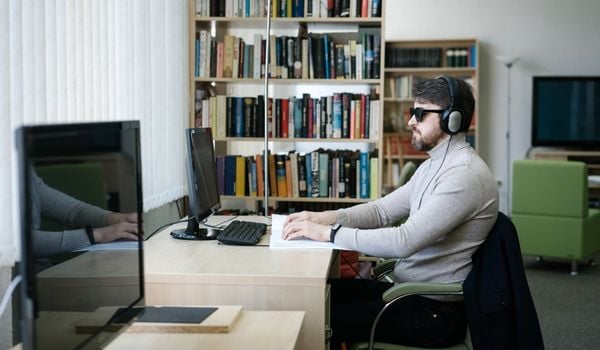This week, Computers in Libraries published an article I collaborated on with Sonya Shryer Norris (aka, The Plum Librarian). The article reports the results of a survey Sonya conducted of over 600 US librarians about accessibility practices and policies in their institutions. For those not familiar, “accessibility,” in this context, refers to whether people with disabilities, particularly the blind, can access web-based resources. Federal law requires that government-funded sites meet certain standards for accessibility.
I feel compelled to offer a confession. When I first started working on “accessibility,” it was a frustration. Early versions of the standards prohibited some useful things that made web pages more appealing and a better, more dynamic experience for most users. The early screen reader tools weren’t great and the whole exercise felt like making things harder for most people to accommodate the needs of a few.
My perspective has changed. Screen readers have gotten better over the years and the standards have been updated. Complying with the current standards still adds work, but they don’t degrade the experience for everyone else. The biggest shift in my perspective, though, had little to do with the screen readers, the standards, or the work involved with compliance. It had to do with someone named Nelson Dent.
Nelson Dent is the staff trainer for the Pioneer Library System in Oklahoma. He’s trained hundreds of librarians with compelling and engaging online programs that he has created himself or curated from many sources. Because of his work, librarians in the Pioneer system know more about key topics like safety, databases, and STEAM programs. They have new skills for working with the homeless, using tech tools, and providing outstanding customer service. And Nelson is legally blind.
I met Nelson in person at a conference a few years back. When he told me about how he uses Niche Academy to create the training programs I’ve described, a light clicked on in my brain. My work with “accessibility” lets Nelson do his job. And because Nelson can do his job, hundreds of library staff have more confidence and more capacity to do theirs. Accessibility unlocks human potential. It lets people with intelligence, creativity, and energy contribute in a way that would otherwise remain untapped. We need their contributions.
Much of Niche Academy’s purpose lies in helping unlock human potential. Our learning management system, staff training, and continued education training helps organizations use and continue to develop and champion their most valuable resource—their people.
Accessibility is a practice, one we have committed to. In our organization, it matters.
